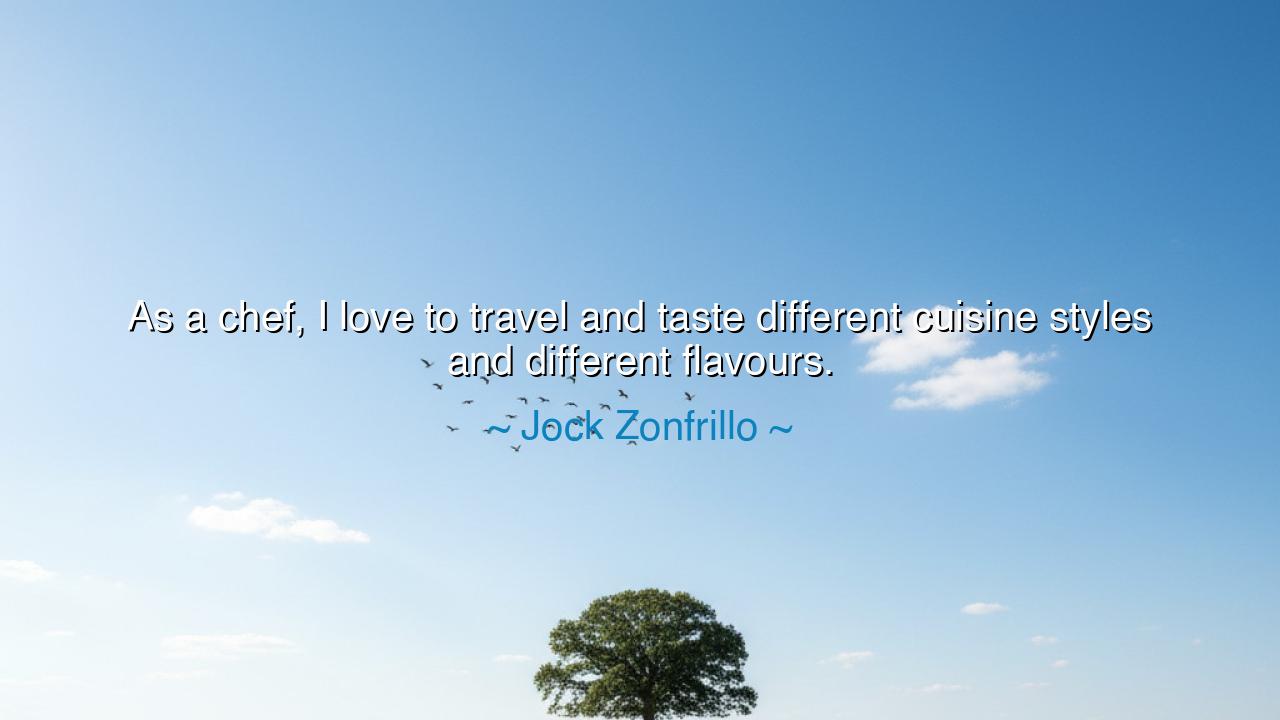
As a chef, I love to travel and taste different cuisine styles






Jock Zonfrillo once spoke with the passion of both craftsman and pilgrim: “As a chef, I love to travel and taste different cuisine styles and different flavours.” In these words lies not only the testimony of a cook, but the creed of one who sees food as the living thread that binds humanity. For the chef, unlike the mere eater, does not pursue taste for pleasure alone, but seeks in every dish the story of a people, the rhythm of a land, the heritage of countless hands that tilled, harvested, and prepared.
The act of travel in this saying is not idle wandering, but a sacred journey. To step into new lands is to step into new kitchens, to smell new spices rising from pots, to break bread baked from unfamiliar grains. Each flavour encountered is a revelation, an opening of the soul to the vast variety of creation. Zonfrillo reminds us that to eat without curiosity is to remain blind, but to taste with reverence is to awaken the spirit. For in a spoonful of curry, in the smoke of barbecued meat, in the tang of fermented vegetables, one can taste the centuries.
The ancients knew this truth well. The Silk Road was not only a path for gold and silk, but for pepper, cinnamon, and saffron. The Romans, who stretched their empire across continents, brought back olives from Greece, wines from Gaul, and spices from the East. To them, the table was a map of conquest and communion alike. The discovery of flavours was also the discovery of the world. So too did explorers like Columbus and Magellan alter history not only by their voyages, but by the foods they carried: potatoes, tomatoes, chilies—treasures that changed the destiny of nations.
Zonfrillo himself, in his journeys, sought more than exotic tastes; he sought wisdom. Among the indigenous peoples of Australia, he found ancient ways of cooking and foraging, traditions carried in memory long before written words. By tasting their cuisine styles, he was not simply sampling dishes—he was entering into dialogue with culture, with history, with resilience. It was a recognition that food is not entertainment, but heritage; not novelty, but a vessel of identity.
What this quote reveals, then, is that the true chef is also a student of life. He travels not for conquest, but for communion. He tastes not to consume, but to understand. Every flavour becomes a teacher, every meal a scripture, every kitchen a temple. The onion and the chili, the rice and the bread, the sweet and the bitter—all speak the same truth in different tongues: that life is diverse, that people are many, and that unity can be found in shared sustenance.
The lesson is radiant: seek the world through its food. Do not shrink into the narrow diet of habit, but allow your spirit to be challenged by the strange, the pungent, the fiery, and the unfamiliar. For to taste another’s dish is to honor their existence, to step for a moment into their lives. It is to cross boundaries without violence, to know without conquest, to commune without words.
Practical action flows from this wisdom. When you travel, do not cling to what is familiar—taste what is set before you. Ask about its story. Learn the names of its spices, the patience of its preparation. Even at home, seek out flavours from distant lands, not to boast of novelty, but to remind yourself that the world is larger than your own table. And if you cook, do so with reverence: every ingredient is a gift, every recipe a memory passed down.
Thus Jock Zonfrillo’s words rise beyond the kitchen and become a law for life: As a chef, as a traveler, as a human being—love to taste the world. For in every flavour is the essence of a people, and in every shared meal is the proof that though we are many, we are bound by the same hunger, the same joy, the same need to break bread together.






AAdministratorAdministrator
Welcome, honored guests. Please leave a comment, we will respond soon